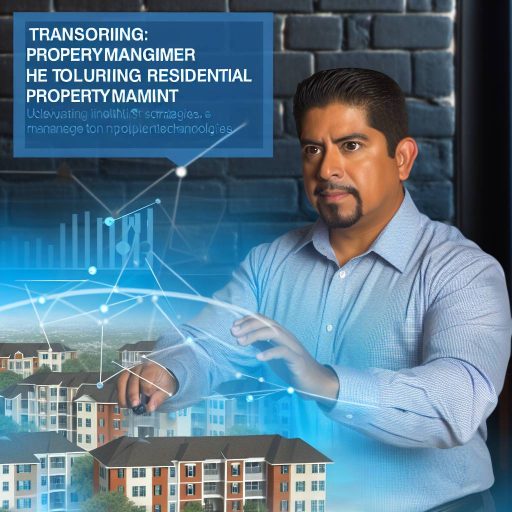Introduction to Blockchain Technology in Real Estate
What is Blockchain?
Blockchain is a decentralized digital ledger technology.
It records transactions across multiple computers securely.
This ensures that the recorded transactions cannot be altered retroactively.
As a result, blockchain provides transparency and security.
Moreover, it eliminates the need for intermediaries.
Application of Blockchain in Real Estate
Blockchain technology significantly innovates the real estate sector.
It transforms how properties are bought, sold, and managed.
First, it allows for faster and more secure transactions.
Second, it enhances the transparency of property ownership.
Third, blockchain can streamline mortgage processing.
Benefits of Blockchain in Mortgage Processing
- Increased transparency minimizes fraud risks.
- Faster transaction times reduce closing delays.
- Lower costs alleviate financial burdens on buyers.
- Smart contracts automate and enforce the agreement terms.
Challenges and Considerations
Despite its advantages, blockchain faces several challenges.
Regulatory uncertainty hampers full adoption in some regions.
Additionally, technical complexities may deter traditional users.
Security concerns about data breaches also require attention.
Therefore, stakeholders must navigate these challenges carefully.
Future of Blockchain in Real Estate
The future of blockchain in real estate looks promising.
As technology evolves, more users will embrace it.
Furthermore, ongoing regulatory developments will shape its use.
Ultimately, blockchain could redefine the real estate landscape.
How Blockchain Works: Key Concepts and Terms
Definition of Blockchain
Blockchain is a decentralized digital ledger technology.
It securely records transactions across many computers.
Each transaction forms a block, linked together in chronological order.
Importantly, altering any block requires changing all subsequent blocks.
Key Components of Blockchain
Three main components define blockchain technology.
- Blocks: Each block contains transaction data, a hash, and the previous block’s hash.
- Nodes: These are individual computers participating in the blockchain network.
- Miners: Miners validate transactions and add blocks to the chain.
How Transactions are Verified
Transaction verification involves a consensus mechanism.
In most cases, this means reaching agreement among nodes.
For example, in Proof of Work, miners solve complex mathematical problems.
This process earns them the right to add the next block.
Smart Contracts
Smart contracts are self-executing contracts with the terms directly written into code.
They automatically execute transactions when conditions are met.
By using smart contracts, the need for intermediaries reduces significantly.
Benefits of Blockchain Technology
Blockchain offers several significant advantages.
- Transparency: All transactions are visible to participants.
- Security: The decentralized nature makes it highly secure.
- Efficiency: Automated processes streamline operations.
Challenges Facing Blockchain Technology
Despite its benefits, blockchain faces certain challenges.
- Scalability: Many blockchain networks struggle with handling large volumes of transactions.
- Regulatory Uncertainty: Governments are still figuring out how to regulate blockchain.
- Energy Consumption: Some consensus mechanisms consume a lot of energy.
Benefits of Using Blockchain for Mortgage Processing
Increased Transparency
Blockchain technology ensures all transactions are recorded transparently.
This transparency enhances trust among parties involved in mortgage processing.
Moreover, anyone can access the transaction history, promoting accountability.
Enhanced Security
Blockchain uses cryptographic techniques to secure data.
This makes it extremely difficult for unauthorized parties to alter records.
As a result, mortgage processing becomes safer and more secure.
Faster Transactions
Blockchain can significantly speed up the mortgage approval process.
Smart contracts automate key steps, reducing manual intervention.
Therefore, borrowers can receive approvals much quicker than traditional methods.
Cost Reduction
Utilizing blockchain reduces the need for intermediaries in transactions.
This results in lower transaction fees for borrowers and lenders alike.
Consequently, both parties can save money in the mortgage processing flow.
Improved Accuracy
Blockchain minimizes human error by automating data entry.
This leads to more accurate documentation and record-keeping.
Thus, the overall process becomes more efficient and reliable.
Streamlined Documentation
With blockchain, all documents are stored in a single, secure ledger.
This eliminates the need for physical paperwork, simplifying access to documents.
Ultimately, this streamlining facilitates faster decision-making.
Learn More: Online Real Estate Platforms for Real Estate Investors
Challenges and Limitations of Blockchain in Real Estate
Technical Complexity
Implementing blockchain in real estate requires significant technical expertise.
This complexity can deter smaller companies from adopting the technology.
As a result, they may rely on traditional systems that are more familiar.
Regulatory Compliance
Blockchain technology faces various regulatory hurdles in real estate transactions.
Entities must navigate a complex landscape of laws and regulations.
These regulations can differ significantly from one jurisdiction to another.
High Initial Costs
Setting up a blockchain system involves substantial initial investment.
Many businesses find it challenging to justify these costs without guaranteed returns.
This situation often limits blockchain adoption to larger corporations.
Data Privacy Concerns
Privacy is a critical issue when using blockchain in real estate.
Blockchain is inherently transparent, which can conflict with data privacy laws.
Companies must find ways to protect sensitive information while ensuring compliance.
Integration with Existing Systems
Integrating blockchain with legacy systems presents significant challenges.
Many current real estate systems have been in place for decades.
This integration can lead to complications and potential data integrity issues.
Limited Understanding and Awareness
There is often a lack of understanding about blockchain technology in the real estate sector.
This knowledge gap can lead to resistance among stakeholders.
Educational initiatives are necessary to promote better awareness and understanding.
Scalability Issues
Many blockchain solutions face scalability challenges as transactions increase.
High volumes of transactions can lead to slow processing times.
This delay can hinder the platform’s efficacy in high-demand markets.
See Related Content: Real Estate Market Analytics Tools for Rental Property Analysis
Steps Involved in Blockchain-Based Mortgage Transactions
Initiating the Transaction
First, borrowers express their intent to secure a mortgage.
They gather necessary documentation, such as income statements and identification.
Next, they approach a lender willing to use blockchain for processing.
Smart Contract Creation
The lender and borrower collaborate to create a smart contract.
This digital contract outlines all terms and conditions of the mortgage.
It includes payment schedules, interest rates, and penalties for default.
Verification of Information
Once the smart contract is established, the lender verifies the borrower’s information.
Third-party services may confirm income and creditworthiness.
Professionals like title companies provide property data verification.
Funds Transfer and Recording
Upon approval, the lender transfers funds directly to the seller.
This transfer happens through a secure blockchain network.
All transactions are recorded immutably in the blockchain ledger.
Property Title Transfer
The next step involves transferring the property title to the borrower.
This process is recorded on the blockchain, ensuring transparency.
Ownership history is permanently stored for future reference.
Ongoing Payments Tracking
As payments are made, they are recorded in real time on the blockchain.
This tracking provides both parties with up-to-date payment status.
Overall, it enhances trust between lenders and borrowers.
Handling Defaults
If a borrower fails to make payments, the smart contract triggers specific actions.
For instance, it may automatically initiate foreclosure procedures.
This ensures that lenders can recover their investment without delays.
Benefits of Blockchain in Mortgage Processing
Using blockchain streamlines the mortgage process significantly.
It reduces paperwork and the potential for fraud.
Moreover, transaction speeds are noticeably faster than traditional methods.
Discover More: Smart Contracts and Their Impact on Real Estate Deals

Case Studies: Successful Implementations of Blockchain in Mortgages
Introduction to Case Studies
Blockchain technology revolutionizes various sectors, including mortgages.
This section explores real-world applications in mortgage processing.
We will examine notable case studies and their impacts.
Case Study: Propy’s Innovative Solutions
Propy, a pioneer in blockchain for real estate, has made significant strides.
They enable transactions to occur using smart contracts.
This process enhances transparency and reduces fraud risks.
Propy’s solution streamlines closing processes for buyers and sellers.
As a result, users benefit from faster transactions.
Case Study: U.S. Real Estate on the Blockchain
In 2020, the city of South Burlington, Vermont, recorded a land deed on the blockchain.
This marked a milestone in real estate documentation.
The initiative aimed to enhance security and accessibility of records.
Additionally, it improved traceability of ownership and transactions.
Local officials also observed cost reductions in record-keeping processes.
Case Study: Mortgages Using Ethereum
In 2019, a startup leveraged the Ethereum blockchain for mortgage financing.
They simplified eligibility verification through smart contracts.
This approach eliminated the need for manual document verification.
Consequently, lenders accessed borrower data in real-time.
The method increased efficiency and reduced approval times.
Case Study: Blockchain Adoption in Europe
Several European nations are testing blockchain applications in housing markets.
For instance, Sweden is digitizing all land titles on the blockchain.
This initiative aims to foster transparency in property transactions.
Additionally, it helps mitigate fraudulent activities in property ownership.
The project has garnered positive feedback from stakeholders.
Lessons Learned from Case Studies
Successful implementations reveal key insights into blockchain technology.
First, transparency significantly boosts trust among participants.
Furthermore, efficiency improvements lead to cost reductions.
Finally, increased security enhances overall transaction reliability.
Discover More: IoT Home Surveillance for Property Protection
Regulatory Considerations and Compliance Issues
Overview of Regulatory Framework
Blockchain technology in mortgage processing faces various regulatory challenges.
Regulators strive to address issues surrounding transparency and security.
In particular, they aim to protect consumer rights and privacy.
Key regulatory bodies include the Consumer Financial Protection Bureau and the SEC.
Compliance with Financial Regulations
Mortgage processors must adhere to laws like the Dodd-Frank Act and RESPA.
These regulations ensure fair lending practices and clear disclosures.
Moreover, compliance fosters consumer trust in blockchain systems.
Entities must implement robust anti-money laundering policies.
Legal Framework for Smart Contracts
Smart contracts further complicate the regulatory landscape.
They allow for automated transactions but raise legal questions.
Legal recognition of smart contracts varies by jurisdiction.
This inconsistency challenges the integration of blockchain in mortgage processing.
Consumer Data Protection
Data privacy is a significant concern in blockchain mortgages.
Compliance with laws like GDPR is crucial for companies operating in Europe.
Businesses must ensure they handle consumer data securely and transparently.
Failure to comply could result in severe legal repercussions.
Emerging Regulatory Trends
As blockchain technology evolves, so do regulatory frameworks.
Governments are increasingly seeking to establish clear guidelines.
This proactive approach helps mitigate risks associated with innovation.
Stakeholders must remain informed about changes in regulations.
Through ongoing compliance, the industry can adapt effectively.
Future Trends: The Evolution of Blockchain in the Mortgage Industry
Increased Transparency
Blockchain provides unparalleled transparency in mortgage transactions.
This transparency helps build trust between borrowers and lenders.
Additionally, it shows clear, immutable records of all transactions.
As a result, disputes over loan terms may diminish.
Enhanced Security
Security is a crucial aspect of blockchain technology.
Blockchain encrypts transactions, making them nearly impossible to alter.
This encryption protects sensitive borrower information effectively.
Thus, it significantly reduces the risk of fraud.
Improved Efficiency
Blockchain streamlines mortgage processing significantly.
Smart contracts automate various tasks within the mortgage process.
These contracts execute automatically when contract conditions are met.
Consequently, closing times may reduce, benefiting all parties involved.
Cost Reduction
Over time, blockchain can lead to lower transaction costs.
It eliminates the need for many intermediaries in mortgage processing.
With fewer middlemen, fees can drop substantially.
Borrowers can ultimately enjoy more favorable loan terms.
Decentralization of Services
Blockchain encourages a shift toward decentralized mortgage services.
This shift allows borrowers to connect directly with lenders.
As a result, it diminishes reliance on traditional banks and brokers.
This change can create more competitive rates in the market.
Future Adoption Rates
The adoption of blockchain in the mortgage industry is gradually increasing.
As more companies embrace this technology, innovation will flourish.
Industry leaders will invest in blockchain-based solutions actively.
Efforts will focus on integrating these solutions into existing systems.
Additional Resources
Finance and Insurance (FINA) < Northeastern University Academic ...




